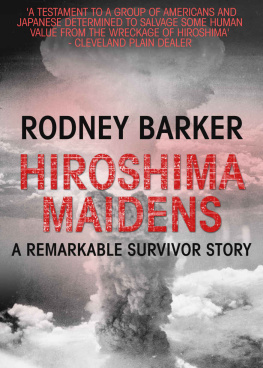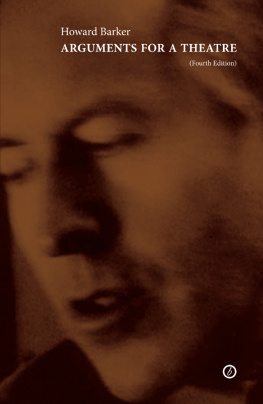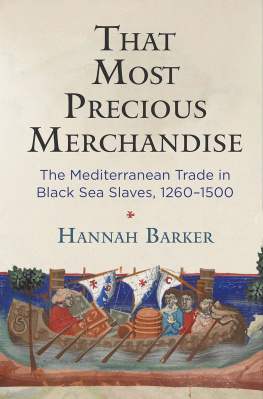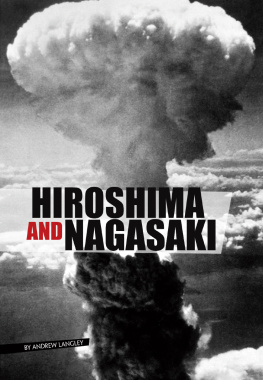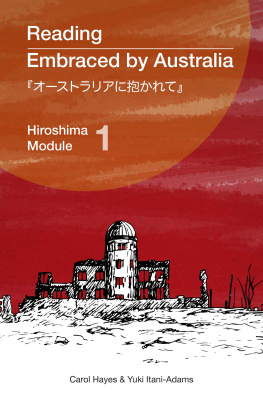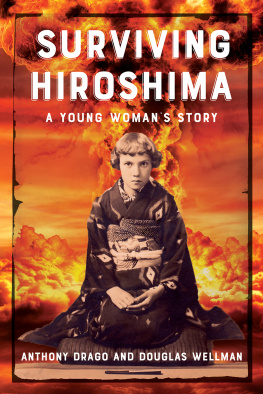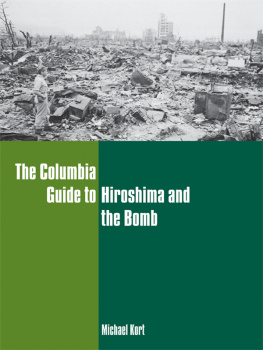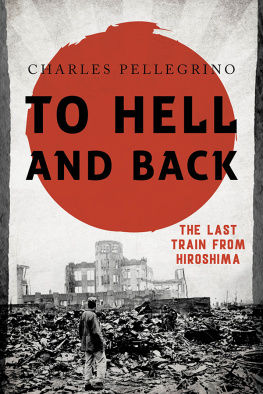The Hiroshima Maidens
Rodney Barker
Copyright Rodney Barker 1986
The right of Rodney Barker to be identified as the author of this work has been asserted by him in accordance with the Copyright, Designs and Patents Act, 1988.
First published in the United Kingdom in 1986 by Penguin Books.
This edition published in 2015 by Endeavour Press Ltd.
To
TADAKO EMORI YOSHIE ENOKAWA
TAKAKO HARADA YOSHIE HARADA
HIDEKO HIRATA SUZUE HIYAMA
MISAKO KANNABE TERUE KAWAMURA
KEIKO KAWASAKI CHIEKO KIMURA
SAYOKO KOMATSU MITSUKO KURAMOTO
TOYOKO MORITA TOMOKO NAKABAYASHI
SHIGEKO NIIMOTO MICHIKO SAKO
TAZUKO SHIBATA HIDEKO SUMIMURA
EMIKO TAKEMOTO HIROKO TASAKA
MASAKO WADA ATSUKO YAMAMOTO
MICHIKO YAMAOKA MOTOKO YAMASHITA
MICHIYO ZOMEN
Table of Contents
Foreword
In 1955, ten years after World War II, a group of twenty-five young Japanese women crippled and disfigured in the atomic bombing of Hiroshima were brought to America for reconstructive surgery. The operations were performed at Mount Sinai Hospital in New York City, and Quaker families in the surrounding area provided home care, which is how two of the Hiroshima Maidens as they were called by the press, came to stay with my family. I was nine years old at the time.
Looking back now, almost thirty years later, it is difficult to pinpoint the significance of that experience or say how it affected me. I suppose I was too young for the feelings of awe or terror that one might expect. Our two visitors lived with us in an intimate everyday way; they seem more like a fact of my early life than a formative event. And there were competing first impressions: I had never come into contact with Orientals before; I was the oldest of three boys, and one might say these were my first and only sisters.
My memories of the Hiroshima Maidens are the fare of family life. Because they did not speak English, they seemed to be more comfortable and natural around children than adults. We engaged in activities with a shared spirit of innocence and wonder that made them easy to be with. Its true they could be terribly unsure of themselves, but often that shyness would lead to a new experience. They liked to swim, for instance, but were too self-conscious to appear on a public beach in bathing suits, so on warm summer evenings when my father came home from work, he would drive us all to a private cove where we would wade into Long Island Sound under cover of night.
My contact with the Maidens taught me something valuable and lasting. They were people who in their own quiet way continued to be a lasting part of my consciousness. At an impressionable age I learned that war leaves a legacy of human suffering that does not end with peace. From then on I understood that at any given moment the world I knew could come to an end. To have learned that at an early age is no small thing, although I am not sure how much more differently inclined it made me than others who grew up in the fifties.
Twenty-five years passed before the memory of the Maidens came around in such a way that I thought of it as a subject to be written about. At the time I was a free-lance journalist writing for a number of magazines, so the idea of doing a follow-up on the Hiroshima Maidens was framed as an article in my mind. But when my research revealed that there had been no books written about them in either English or Japanese, and that the several magazine attempts at updates were superficial and incomplete, it struck me that here was an unwritten story not only of great personal interest but timely and important. In the process of writing that story, I felt I would discover the meaning of the experience.
Every writing assignment bristles with its own set of difficulties, and the complexities involved in researching this story were daunting. While there was a considerable amount of press coverage of the Maidens during their stay in America, for all intents and purposes they had dissolved as a group once they returned to Japan. No one knew what had happened to them individually, or, for that matter, how many of them were still alive.
Over the next few months I tracked down a dozen or so American families who had hosted the Maidens, and I visited them in their homes, probing their memories and leafing through scrapbooks retrieved from their attics. Next I located and interviewed the key figures involved in organizing the project that brought the Maidens to America, including the surgeons who performed their operations. Thanks to a grant from a foundation in Japan willing to pay my way over and back in exchange for a series of articles about my impressions of Hiroshima, I was able to depart for Japan in the summer of 1979.
The day I arrived in Hiroshima, I was made aware that the relationship between atomic bomb survivors and the press in that city had become an exceedingly difficult one. The news editor of a major daily newspaper met me at the train station; after escorting me to the newspapers main office building and leading me through a ceremonious round of civilities with department heads, he casually suggested that we pay a visit to Suzue Hiyama, one of the Hiroshima Maidens who had stayed with my family. I had half-expected this to come up it made a good reunion story but not so abruptly nor in this manner. I replied that I preferred to wait; etiquette alone dictated that I should talk with Suzue first and clear such a meeting.
My hesitation seemed to take him by surprise. Surely, as a fellow journalist, I could see the value of an immediate visit, an experience captured live?
It was assumed, I think, that we would have roughly the same aggressive attitude toward news. And, as I later learned, the idea of a detailed follow-up story on the Hiroshima Maidens had tantalized and frustrated Japanese journalists for years; the women either could not be found or reached, or flatly refused to be interviewed. It took some doing to convince my editor friend that I intended to handle this my way, and I was deliberately vague about giving assurances I would keep him informed of my plans so he could arrange for his papers sister broadcasting company to have a television crew standing by.
Later that evening, with the assistance of a young Japanese woman I met at an international boarding house, I telephoned Suzue Hiyama. She was expecting my call. Reporters had been phoning her for weeks. I apologized for the inconvenience my coming had caused her and assured her that when we got together I would be alone except for an interpreter. We arranged to meet the following evening.
On the phone she had said she lived in an apartment above her place of business, and when the taxi pulled up in front of a beauty parlor named after my home town in Connecticut and her home in the States the Darien Beauty Shop Suzue was waiting outside. She bowed, I nodded, and as she eyed me inquiringly, I appraised her. Her face still showed signs that it had something very much wrong with it; the flap of skin grafted to her left cheek was too smooth and had not wrinkled the way one would expect it to with age. But while that might have attracted the notice of a stranger seeing her for the first time, it corresponded with the mental picture that I had carried for twenty-five years. After all, scarred was the only way I had known her. She seemed more unsure of me, which was understandable enough considering the fact that she remembered an energetic, freckle-faced nine-year-old. Smiling down at her (she came barely up to my chest), I produced an old photograph taken the night she and her roommate dressed me up in a young girls kimono. Her embarrassed little smile let me know I had passed the test.
We spent the next few hours catching up on the previous twenty-five years. I told her what had happened to my family, and she introduced me to hers. Her husband shook my hand and thanked me for the hospitality my parents had extended to his wife. Her two teenage daughters grinned sheepishly. Her grandchild burst into tears.
Next page
